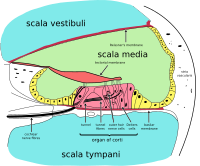
Photo from wikipedia
Hereditary hearing loss is highly heterogeneous. Despite over 120 non-syndromic deafness genes have been identified, there are still some of novel genes and variants being explored. In the study, we… Click to show full abstract
Hereditary hearing loss is highly heterogeneous. Despite over 120 non-syndromic deafness genes have been identified, there are still some of novel genes and variants being explored. In the study, we investigated 105 Chinese Han children with non-syndromic, prelingual, severe-profound hearing loss by whole-exome sequencing on DNA samples. The most common deafness gene was GJB2, mainly in variant c.235delC (p.Leu79CysfsTer3). 14 children were identified with pathogenic mutations in three genes, GJB2, SLC26A4, and OTOF. Two mutations have been identified to be pathogenic and not recorded previously, including c.4691G>A (p.Trp1564Ter) and c.3928_3930dup (p.Lys1310dup) in OTOF. The rare variants c.1349G>A (p.Arg450His) and c.456T>G (p.Asn152Lys) in GSDME, and c.1595G>T (p.Ser532Ile) in SLC26A4 were detected. The frequency of nonsense variant c.2359G>T (p.Glu787Ter) in OTOA was very high in 17 cases. Four of them were identified to be digenic inheritance, including GJB2 and COL4A4, GJB2 and EYA1, GJB2 and COL4A5, and GJB2 and DFNA5. The findings showed that a novel pathogenic variant and rare variants may be associated with severe and profound hearing loss.
Journal Title: Gene
Year Published: 2022
Link to full text (if available)
Share on Social Media: Sign Up to like & get
recommendations!